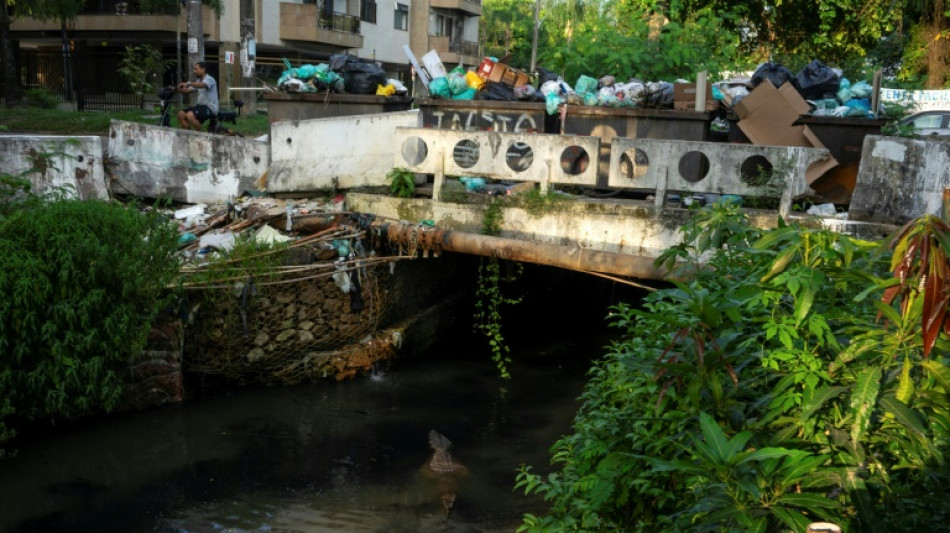
-
 Liverpool late show floors Nottingham Forest
Liverpool late show floors Nottingham Forest
-
Rimac Nevera R: Beyond imagination

-
 USA beat Canada to win men's Olympic ice hockey gold
USA beat Canada to win men's Olympic ice hockey gold
-
Samardzic seals comeback win for Atalanta over Napoli

-
 Eileen Gu switches slopes for catwalk after Olympic flourish
Eileen Gu switches slopes for catwalk after Olympic flourish
-
Luce: Ferrari's ingenious electric revolution

-
 Miller guides South Africa to 187-7 against India
Miller guides South Africa to 187-7 against India
-
Scotland boss 'proud' of comeback Six Nations win over Wales

-
 Iranian students rally for second day as fears of war with US mount
Iranian students rally for second day as fears of war with US mount
-
US Secret Service kills man trying to access Trump Florida estate

-
 Coventry 'let the Games do their magic': former IOC executives
Coventry 'let the Games do their magic': former IOC executives
-
Cayenne Turbo Electric 2026

-
 Sri Lanka have to qualify 'the hard way' after England drubbing
Sri Lanka have to qualify 'the hard way' after England drubbing
-
Doris says Six Nations rout of England is sparking Irish 'belief'

-
 Thousands of pilgrims visit remains of St Francis
Thousands of pilgrims visit remains of St Francis
-
Emotional Gu makes history with Olympic freeski halfpipe gold

-
 Impressive Del Toro takes statement victory in UAE
Impressive Del Toro takes statement victory in UAE
-
Gu wins triumphant gold of Milan-Cortina Olympics before ice hockey finale

-
 England rout Sri Lanka for 95 to win Super Eights opener
England rout Sri Lanka for 95 to win Super Eights opener
-
Underhill tells struggling England to maintain Six Nations 'trust' as Italy await

-
 Alfa Tonale 2026: With a new look
Alfa Tonale 2026: With a new look
-
BMW 7 Series and i7: facelift in 2026

-
 Eileen Gu makes history with Olympic freeski halfpipe gold
Eileen Gu makes history with Olympic freeski halfpipe gold
-
Eileen Gu makes history with Olympic halfpipe gold

-
 Morocco flood evacuees mark muted Ramadan away from home
Morocco flood evacuees mark muted Ramadan away from home
-
Lucid Gravity 2026: Test report

-
 Sri Lanka restrict England to 146-9 in T20 World Cup Super Eights
Sri Lanka restrict England to 146-9 in T20 World Cup Super Eights
-
West Indies wary of Zimbabwe's 'X-factor' quick Muzarabani

-
 Bentley: Visions for 2026
Bentley: Visions for 2026
-
Eileen Gu wins Olympic gold in women's freeski halfpipe

-
 First 'dispersed' Winter Olympics a success -- and snow helped
First 'dispersed' Winter Olympics a success -- and snow helped
-
Six stand-out moments from the 2026 Winter Olympics

-
 Andrew's arrest hands King Charles fresh royal crisis
Andrew's arrest hands King Charles fresh royal crisis
-
Afghans mourn villagers killed in Pakistani strikes

-
 Jeeno Thitikul brings home LPGA win in Thailand
Jeeno Thitikul brings home LPGA win in Thailand
-
Snowboard champion Karl '99 percent' sure parallel giant slalom will stay in Olympics

-
 Greenland does not need US hospital ship: Danish minister
Greenland does not need US hospital ship: Danish minister
-
Russian missile barrage hits energy, railways across Ukraine

-
 Ka Ying Rising makes Hong Kong racing history with 18th win
Ka Ying Rising makes Hong Kong racing history with 18th win
-
St Francis relics go on public show for first time in Italy

-
 Deflated Australia face tough questions after T20 World Cup flop
Deflated Australia face tough questions after T20 World Cup flop
-
Brazil's Lula urges Trump to treat all countries equally

-
 Knicks rally to down Rockets as Pistons, Spurs roll on
Knicks rally to down Rockets as Pistons, Spurs roll on
-
Brumbies end 26-year jinx with thrashing of Crusaders

-
 Pakistan launches deadly strikes in Afghanistan
Pakistan launches deadly strikes in Afghanistan
-
Son's LAFC defeats Messi and Miami in MLS season opener

-
 Korda to face Paul in all-American Delray Beach final
Korda to face Paul in all-American Delray Beach final
-
Vikings receiver Rondale Moore dies at 25

-
 Copper, a coveted metal boosting miners
Copper, a coveted metal boosting miners
-
Indigenous protesters occupy Cargill port terminal in Brazil


Brazil caimans fight to survive in polluted Rio waters
Intrepid as Crocodile Dundee, Brazilian biologist Ricardo Freitas catches a caiman in the dark of night with a snare pole, then hoists it into his small wooden boat.
Unfazed by the reptile's sharp teeth, he grabs it by the snout and wraps a black band around its muzzle to examine it without getting bitten.
The 1.5-meter (five-foot) caiman is right at home in the lagoon waters of Jacarepagua, a vast, urban district on Rio de Janeiro's west side whose name means "Valley of the Caimans" in the Tupi-Guarani Indigenous language.
Despite the name, there is little trace in Jacarepagua these days of verdant valley or tropical forest: it is increasingly a concrete jungle, with upmarket high-rises surrounding the lagoon and tens of thousands of residents' waste water emptying into it.
Freitas's boat floats on the foul-smelling water directly in front of the sprawling Olympic village from the 2016 Rio Games.
The 44-year-old biologist fears for the future of this ancient species in a world of rampant urbanization: "They're threatened with extinction," he says.
- Swallowed trash and condoms -
Freitas estimates the region is home to around 5,000 broad-snouted caimans (Caiman latirostris).
The largest grow to more than three meters long.
One major threat to their survival: 85 percent of the specimens he examines are males, an imbalance he blames on pollution.
"Caimans are laying their eggs in extremely polluted areas, where the water temperature is higher. That makes it more likely the offspring will be males," he says.
"It's a species where sex is determined by the incubation temperature of the eggs... Here, the water is a lot warmer because of all the decomposing materials."
That threatens the entire ecosystem, not just the caimans, he adds.
"Since (caimans) are at the top of the food chain, they are key to maintaining equilibrium between species. Without caimans, the area's biodiversity would be completely compromised."
Freitas, who has a PhD in ecology, has been studying these waters for more than 20 years.
The head of a small conservation group called the Jacare Institute, he has captured and logged data on more than 1,000 caimans.
Aboard his boat, he weighs, measures and takes scale samples from the reptiles to analyze them for levels of contamination from lead, mercury and other heavy metals.
He also pumps their stomachs to see what they have been eating.
"I've found all kinds of waste: plastic bags, pieces of cans, bottle caps, even condoms," he says.
- 'State of abandonment' -
Rampant urbanization has steadily reduced the caimans' native habitat, drawing them into polluted residential areas in search of food.
In a canal through the Terreirao, a working-class neighborhood, caimans are literally swimming in refuse.
One peeks out just its snout through a carpet of waste in the water, including a dismembered doll and a deflated football.
"It's sad to see them in the middle of all this pollution. It's a little scary to live so close to them, but they almost never leave the water," says 34-year-old resident Regina Carvalho, a preschool assistant.
When the canal floods, locals sometimes find themselves nose to nose with the wild animals.
But shopkeeper Alex Ribeiro, 58, says he has "never heard any talk of attacks."
"Everything is in a state of abandonment here, with makeshift sewage pipes from people's houses emptying into the canal," he says.
"You can imagine the level of pollution the caimans are exposed to."
C.Garcia--AMWN



